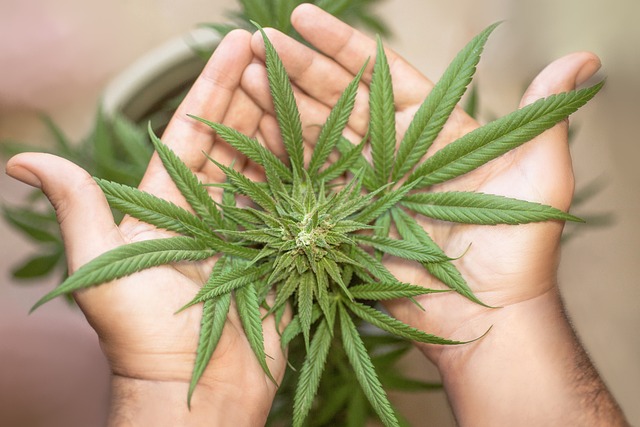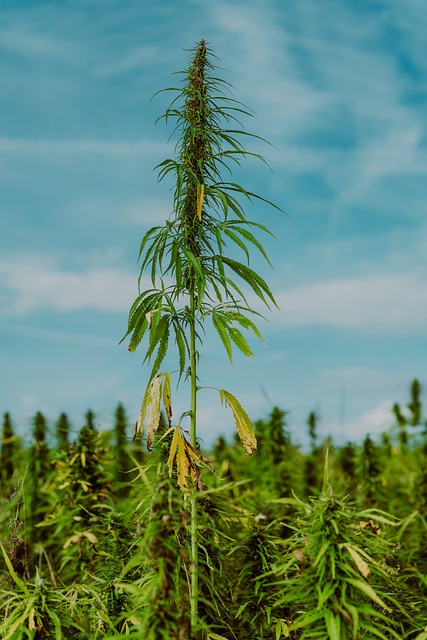The THCA flower, a non-psychoactive component of cannabis, is garnering attention for its potent anti-inflammatory properties. Research indicates that THCA interacts with the endocannabinoid system, potentially modulating immune responses and reducing inflammation without the psychoactive effects of THC. Studies suggest that THCA flower can inhibit pro-inflammatory cytokines and enzymes, offering a natural approach to managing chronic conditions like arthritis and persistent pain. The anti-inflammatory efficacy of THCA is amplified by its role in enhancing anandamide reuptake and impeding its degradation. Preliminary research has shown that THCA could serve as a key therapeutic agent for inflammation-related diseases, with ongoing investigations aiming to deepen the understanding of its medical applications. The anti-inflammatory compounds within the THCA flower are under rigorous examination for their potential to alleviate symptoms across various inflammatory conditions, with a call for further human clinical trials to confirm its efficacy and safety. The scientific community is keen on exploring the broader implications of THCA to substantiate its therapeutic benefits and potentially integrate these findings into evidence-based medical practice.
Exploring the therapeutic potential of THCA flower, this article delves into its anti-inflammatory properties and the myriad benefits it offers. From understanding the endocannabinoid system’s interaction with THCA to examining clinical studies, we shed light on the science behind its health-promoting effects. As a natural alternative for managing inflammation, THCA flower is gaining attention. This piece also addresses common side effects associated with its use, dosage considerations, and legal status. With a focus on quality, handling, and storage to preserve potency, readers will gain insights into personalizing their THCA flower experience for optimal health benefits. Join us as we uncover the future implications of THCA research in healthcare.
- Unraveling THCA Flower and Its Anti-Inflammatory Compounds
- What is THCA and How Does it Affect Inflammation?
- The Science Behind THCA's Anti-Inflammatory Properties
- Potential Health Benefits of THCA Flower Beyond Anti-Inflammation
- Understanding the Role of THCA in the Endocannabinoid System
- Exploring Clinical Studies and Research Findings on THCA's Effects
Unraveling THCA Flower and Its Anti-Inflammatory Compounds

Uncovering the potential therapeutic benefits of THCA flower, particularly its anti-inflammatory properties, has garnered significant attention in both scientific and medical communities. Tetrahydrocannabinolic acid (THCA), which is the raw, non-psychoactive form of tetrahydrocannabinol (THC), is found abundantly in hemp and cannabis plants. THCA flower possesses a rich profile of anti-inflammatory compounds, including cannabinoids such as CBD and CBC, which have been shown to interact with the body’s endocannabinoid system. These interactions may modulate inflammatory responses, offering hope for those seeking natural alternatives to traditional pharmaceuticals for managing conditions like arthritis and chronic pain.
Research into the anti-inflammatory effects of THCA flower has revealed that its compounds can inhibit certain pro-inflammatory cytokines and enzymes involved in the inflammatory process. This inhibition could play a role in reducing the symptoms associated with inflammation, potentially providing relief without the psychoactive side effects commonly associated with THC. Furthermore, the anti-inflammatory activity of THCA is believed to be due to its ability to stimulate anandamide reuptake and prevent its breakdown, thereby enhancing the body’s natural endocannabinoid system response. This area of study continues to evolve, with ongoing research aimed at elucidating the full scope of THCA flower’s therapeutic potential.
What is THCA and How Does it Affect Inflammation?

Tetrahydrocannabinolic acid (THCA) is the non-psychoactive precursor to THC, found abundantly in raw cannabis flowers. This natural compound possesses a range of potential health benefits, with significant attention directed towards its anti-inflammatory properties. The human body contains an endocannabinoid system that interacts with cannabinoids like THCA, influencing various physiological processes. THCA’s interaction with the CB2 receptors within this system is believed to play a role in modulating the immune response, particularly in reducing inflammation. Studies have indicated that THCA may be effective in addressing various forms of inflammation, from acute to chronic, without the psychoactive effects associated with its decarboxylated form, THC. This makes THCA an appealing option for individuals seeking relief from inflammatory conditions without cognitive impairment. Its anti-inflammatory compounds are being researched for their potential in treating a variety of inflammation-related diseases and conditions, offering a promising avenue for therapeutic intervention. The precise mechanisms through which THCA exerts its effects on inflammation are still under investigation, but preliminary findings suggest that it may act as a potent anti-inflammatory agent, warranting further study to fully understand its potential in various medical applications.
The Science Behind THCA's Anti-Inflammatory Properties

Delta-9-tetrahydrocannabinolic acid (THCA), which is the raw form of THC found in cannabis flowers, has garnered attention for its potential anti-inflammatory properties. Scientific research indicates that THCA interacts with the body’s endocannabinoid system through its two primary receptors, CB1 and CB2. By binding to these receptors, THCA is believed to modulate immune responses and reduce inflammation, a phenomenon that could be beneficial for various conditions characterized by excessive inflammation. Studies have shown that THCA can inhibit the activity of certain enzymes involved in pro-inflammatory responses, such as cyclooxygenase (COX) and lipooxygenase (LOX), which are key players in the production of prostaglandins and leukotrienes, compounds that contribute to inflammation. This inhibitory effect may underpin THCA’s potential role in managing conditions like arthritis, skin inflammations, and other inflammatory disorders. Furthermore, THCA’s anti-inflammatory effects are thought to stem from its interaction with immune cells, which could lead to a downregulation of pro-inflammatory cytokines, thus offering a natural approach to treating inflammatory conditions without the psychoactive effects associated with delta-9-THC. As research continues to evolve, the understanding of how THCA’s anti-inflammatory compounds may be harnessed for therapeutic purposes becomes increasingly clear, suggesting promising avenues for future investigation in the realm of cannabinoid science and medicine.
Potential Health Benefits of THCA Flower Beyond Anti-Inflammation

THCA flower, which contains tetrahydrocannabinolic acid (THCA), a non-psychoactive precursor to THC, has garnered attention for its potential health benefits beyond its well-documented anti-inflammatory properties. Research indicates that THCA interacts with the body’s endocannabinoid system, which plays a role in regulating various physiological processes. Studies suggest that THCA may possess neuroprotective qualities, potentially beneficial for neurological disorders. Preclinical evidence has shown that THCA can help protect neurons against injury and may have a role in modulating oxidative stress, which is implicated in a range of diseases. Furthermore, THCA flower’s anti-nausea effects are another area of interest, as it may alleviate vomiting and nausea in patients undergoing chemotherapy without the psychoactive effects associated with THC. Additionally, there is promising research on its potential to act as an antibacterial agent, particularly against methicillin-resistant Staphylococcus aureus (MRSA), due to its ability to inhibit bacterial growth. These findings underscore the therapeutic potential of THCA flower beyond its well-known anti-inflammatory compounds, offering a broader scope for its application in health and wellness.
Understanding the Role of THCA in the Endocannabinoid System

The cannabinoid THCA, or tetrahydrocannabinolic acid, is a non-psychoactive precursor to THC found in raw cannabis plants, including flowers. Its potential within the endocannabinoid system is multifaceted, offering therapeutic properties that are gaining scientific attention. The endocannabinoid system (ECS) plays a pivotal role in regulating a range of physiological processes, including pain, inflammation, and immune responses. THCA interacts with the ECS primarily through its affinity for the CB1 and CB2 receptors, although it does not activate them like THC or CBD do. This unique interaction suggests that THCA may influence the ECS without eliciting the psychoactive effects typically associated with cannabis.
Research indicates that THCA possesses anti-inflammatory properties, which could be beneficial in various conditions where inflammation is a factor. The anti-inflammatory compounds found in THCA are thought to work by modulating pro-inflammatory cytokines and other signaling molecules within the ECS. This modulatory effect may help alleviate symptoms associated with inflammatory diseases, such as arthritis or colitis. Additionally, because of its interaction with the ECS, THCA has been studied for its potential role in supporting homeostasis and balance within the body, which is the primary function of this system. Understanding how THCA engages with the ECS can pave the way for novel therapeutic approaches that leverage its anti-inflammatory benefits without the psychoactive component of other cannabinoids.
Exploring Clinical Studies and Research Findings on THCA's Effects

Clinical studies and research findings have consistently pointed to the therapeutic potential of THCA, or tetrahydrocannabinolic acid, a non-psychoactive compound found in the cannabis plant. Particular focus has been placed on its anti-inflammatory properties, which are believed to be derived from its interaction with the body’s endocannabinoid system. Preclinical trials have demonstrated that THCA may exert significant anti-inflammatory effects, suggesting its potential in managing conditions characterized by inflammation. These findings are indicative of THCA’s capacity to modulate certain immune responses and could have implications for a variety of health applications. The anti-inflammatory compounds present in the THCA flower are being scrutinized for their role in alleviating symptoms associated with various inflammatory diseases, including arthritis and multiple sclerosis.
Furthermore, ongoing research is delving into the mechanisms by which THCA may influence human health. Studies have shown that THCA can inhibit certain enzymes and receptor activities involved in the inflammatory process, providing a rationale for its potential use as an anti-inflammatory agent. However, it is imperative to note that while preclinical data is promising, human clinical trials are essential to fully understand the efficacy and safety profile of THCA. As such, the scientific community continues to investigate the effects of THCA flower through rigorous research protocols, with the aim of providing evidence-based insights into its therapeutic benefits.
In conclusion, the investigation into THCA flower’s anti-inflammatory compounds has revealed promising potential health benefits beyond mere reduction of inflammation. The endocannabinoid system’s interaction with these compounds suggests a novel approach to managing various inflammatory conditions. While clinical studies and research findings continue to uncover the myriad ways THCA flower can contribute to overall well-being, it is imperative for individuals to consult healthcare professionals before incorporating it into their health regimen. The anti-inflammatory properties of THCA flower are at the forefront of cannabinoid research and hold significant promise for future therapeutic applications.
